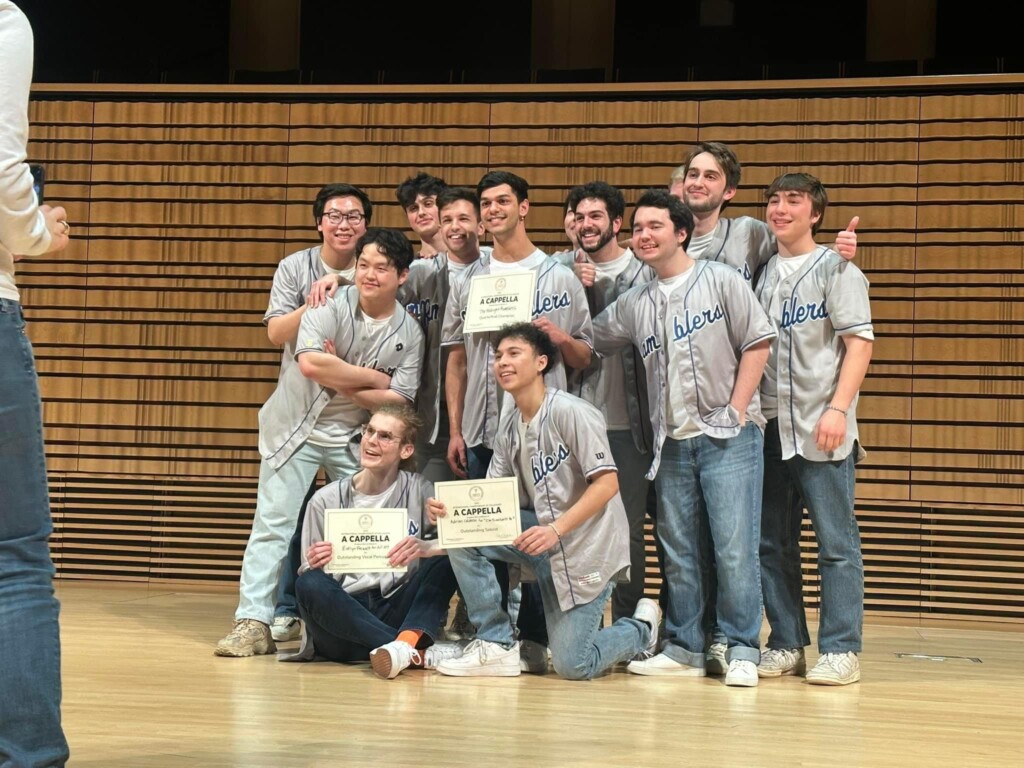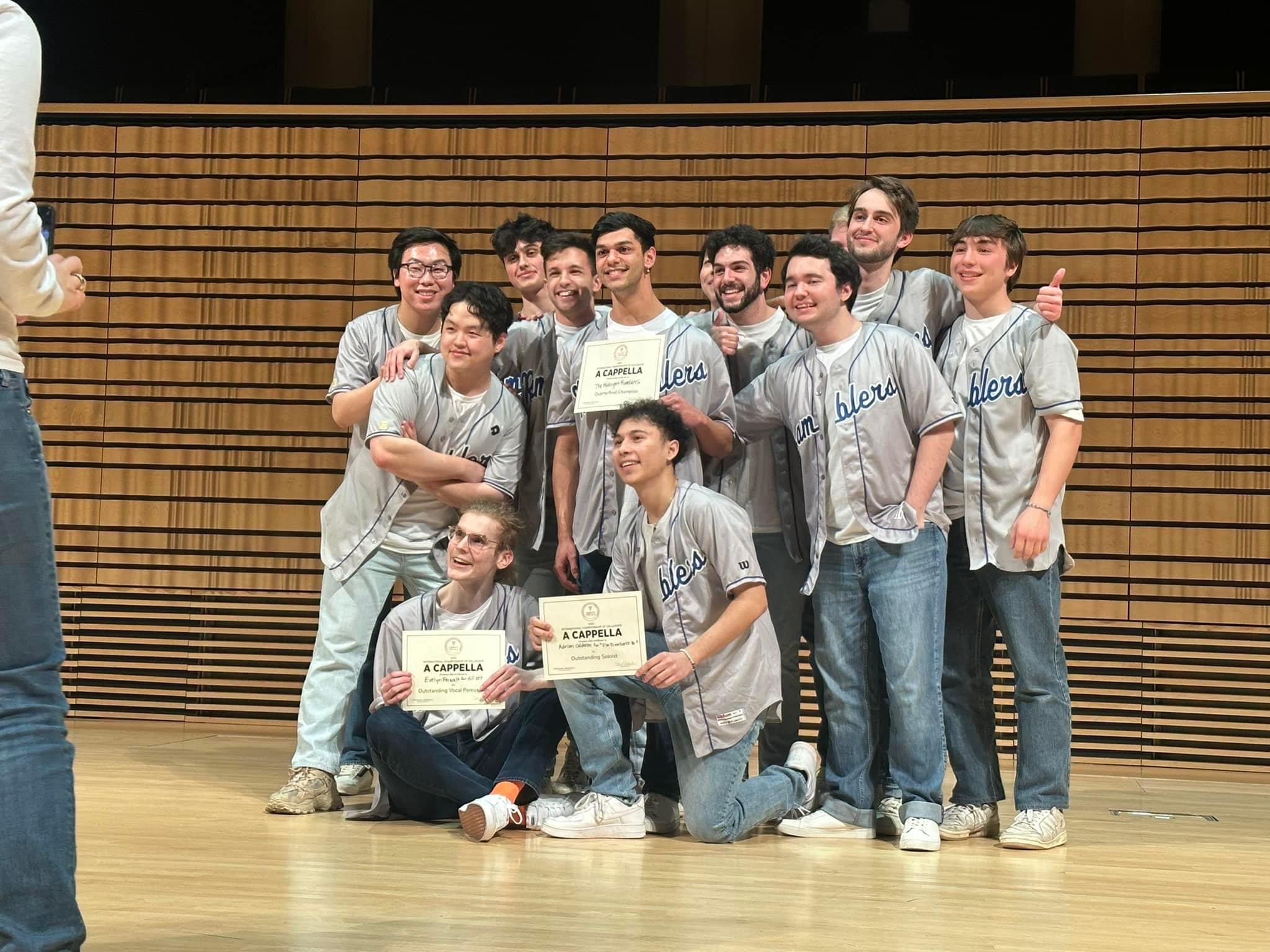Have you ever wondered what it would be like to win an a cappella competition? That would be a question for senior Raahi Klar-Chaudhuri, a member of the Midnight Ramblers a cappella group on campus. Last week, the Midnight Ramblers won the ICCA Quarterfinals at Rensselaer Polytechnic Institute (RPI), and the Campus Times discussed with Klar-Chaudhuri his reactions to winning as well as his group’s preparation process and mindset as competition continues.
First of all, how do you feel about winning the ICCA Quarterfinals at RPI?
I was elated to hear that we won! I’m always grateful to be alongside such incredible musicians, and having it pay off definitely reaffirms that feeling. I’m also hoping that another global pandemic doesn’t cancel our semifinal like it did last time.
Take us through what quarterfinals are like.
The EMPAC at RPI is a gorgeous venue. The whole building is seven stories, most of which is taken up by a giant wooden sphere that houses the auditorium we performed in. We arrived around noon and decided on the performance order an hour later (members of each group picked papers out of a hat). Sound check started right after that, but since we ended up going last we had a little downtime to rehearse spots in our set, do homework, relax, or whatever else. We were put into a large rehearsal space with two of the other groups there, and they were really friendly towards us. I think the same could be said of all the other groups, who weren’t outwardly spiteful of anyone else, even happy for us as we were announced the winners. We ate dinner after that, and once the event began at 7 p.m. we watched the other groups perform until we had to line up backstage. I’m always curious to hear other a cappella groups and enjoy their music.
What’s your favorite part of the Ramblers’ ICCA set this year?
My favorite part of the set is throwing in the emotion, since it reminds me that performing arts aren’t entirely technical, even when they’re competitive. It’s one thing to sing the notes and do the choreography, but moving with conviction and having dramatic facial expressions are a different story entirely.
What preparation led to this event?
We voted unanimously to enter ICCAs at the beginning of the fall semester. From there, constructing the set involved deciding which members of the group wanted to sing solos, which songs they could sing well and tell an emotional story, and finally arranging and learning the music and choreography. The first and last songs in our set were ones that we started to learn last semester and performed at our fall show, while we started to learn the middle song in December. Six days before the quarterfinal, we had a showcase for members of other a cappella groups and Rambler alumni so they could give us feedback on how to improve.
What is prep going to look like for semifinals, given that you’re also preparing for a show? How close together are those two events?
Show prep this semester surprisingly won’t be too intense. March 18 is the group’s 25th anniversary show, so former group members will perform a lot of songs while the current members will basically just perform our competition set (which we already know) and senior solos. Even in a normal semester, we would just do the competition set as one of the sets in the show, so it would look like preparing for any other show. The week of semifinals, which are on March 25, will look normal as well. That’s already four hours spent on a 10-minute set that we’ll be performing for the third time, and it’s important for us to not burn out, especially when the show and semifinals are only a week apart.
You’re one of the few members who did ICCAs in the past — how was this experience different from the quarterfinals in 2020?
Winning in 2020 was a little more shocking, purely because it was my first time. This time, however, I’m more eager to go to the semifinals since COVID-19 canceled the central semifinal three years ago. Not today, Monkeypox.
Referencing your time in the Ramblers, what stands out about this group as compared to the other iterations you’ve sung with?
The Ramblers always try to take unique singers with voices one wouldn’t expect to hear in a stereotypical a cappella group. For that reason, every iteration of the group is radically different from the others. We used to have a bass (Joel Omino ‘21) who won outstanding soloist by sounding spooky and brooding on “Ain’t No Sunshine,” as well as a falsetto-heavy tenor 1 (Ozor Kumi ‘22) who now makes phenomenal Afrobeats and R&B music (stream boistory, shameless plug). Now we have a couple of baritones with ridiculous amounts of soul in their voices, and tenors who remind me of professional pop artists. This makes it a lot easier for us to surprise people and exceed expectations with our music.
Any other thoughts you have or insights on your experience, at ICCAs or otherwise?
I think ICCAs are a great way to let us know how to get better as a group. We always get our score sheets back so we know how good we are on blend, rhythm, intonation, etc. Only the top two groups in each quarter final get to advance to the semis, so it’s important to have other goals besides winning. We always tell ourselves we’re just there to do the best we can, and whatever happens happens. ICCAs in particular also strive to be networking events, since lots of people and coordination go into running them. When we hosted a quarterfinal last year, the sound guy recruited me into a part-time job working setup for a cappella shows around upstate New York.
Best of luck to Klar-Chaudhuri as he and the Midnight Ramblers continue their journey to the semifinals on March 25.


